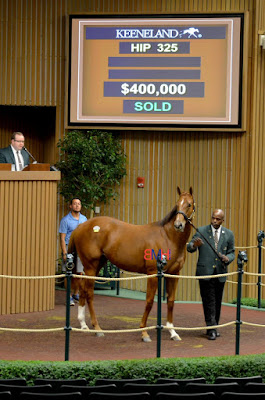Horses Need to Race Past Their Three-Year-Old Year
In a sport dominated by two and three-year-olds, it's hard to believe that older horses have any place in this fast paced world. But while many popular three-year-olds retire with just a few starts in their career, a horse running at the upper levels for multiple years gains a massive following.
One only needs to look at Zenyatta to understand that a horse that spends multiple years in the spotlight can attract a massive following. Another example would be the European supermare Goldikova, who had American fans clamoring to see her at her yearly appearances in the Breeders' Cup races she ran in during her career.
While both example cite successful mares that defied the odds by either taking on males or keeping a winning steak alive, it also proves that fans can be attracted to the track.
In the past few years, we have seen healthy, or slightly injured, horses leave the track at three-years-old because they "have nothing else to prove" or they are offered lucrative stud deals. While this idea is good for breeders, in the long run it is harmful to the sport.
Yes, a horse's three-year-old season is it's most lucrative but their four-year-old and beyond careers can do just as much for their record, especially if they aren't in demand as a stallion prospect.
The horses that continue to race well past the Triple Crown are those that have the potential to become the most popular with both regular horse fans and even those casual fans that may tune into racing once or twice a year.
So instead of racing to the breeding shed at the first sign that something is wrong, we should be looking for ways to market the horses that return month after month at the highest levels of competition. Not only is it good for the horse, it's good for the sport as well. And anything that is good for the sport is good for those people in it.
Any way you look at it, continuing to race horses past their three-year-old year is a win/win that should be considered when any decision are made about rushing horses off to the breeding shed.
If the trend of retiring horses at a young age can be turned around, there's no doubt the sport has a fighting chance.
The major question is: Will breeders take the initiative to take a year or two out of the breeding shed in order to try and save their sport or will we continue to see three-year-old retirement notices all over the racing publications in the coming years?
It's definitely an interesting question to ponder and one I hope we get a positive answer to very soon.
While both example cite successful mares that defied the odds by either taking on males or keeping a winning steak alive, it also proves that fans can be attracted to the track.
In the past few years, we have seen healthy, or slightly injured, horses leave the track at three-years-old because they "have nothing else to prove" or they are offered lucrative stud deals. While this idea is good for breeders, in the long run it is harmful to the sport.
Yes, a horse's three-year-old season is it's most lucrative but their four-year-old and beyond careers can do just as much for their record, especially if they aren't in demand as a stallion prospect.
The horses that continue to race well past the Triple Crown are those that have the potential to become the most popular with both regular horse fans and even those casual fans that may tune into racing once or twice a year.
So instead of racing to the breeding shed at the first sign that something is wrong, we should be looking for ways to market the horses that return month after month at the highest levels of competition. Not only is it good for the horse, it's good for the sport as well. And anything that is good for the sport is good for those people in it.
Any way you look at it, continuing to race horses past their three-year-old year is a win/win that should be considered when any decision are made about rushing horses off to the breeding shed.
If the trend of retiring horses at a young age can be turned around, there's no doubt the sport has a fighting chance.
The major question is: Will breeders take the initiative to take a year or two out of the breeding shed in order to try and save their sport or will we continue to see three-year-old retirement notices all over the racing publications in the coming years?
It's definitely an interesting question to ponder and one I hope we get a positive answer to very soon.


Comments
Post a Comment